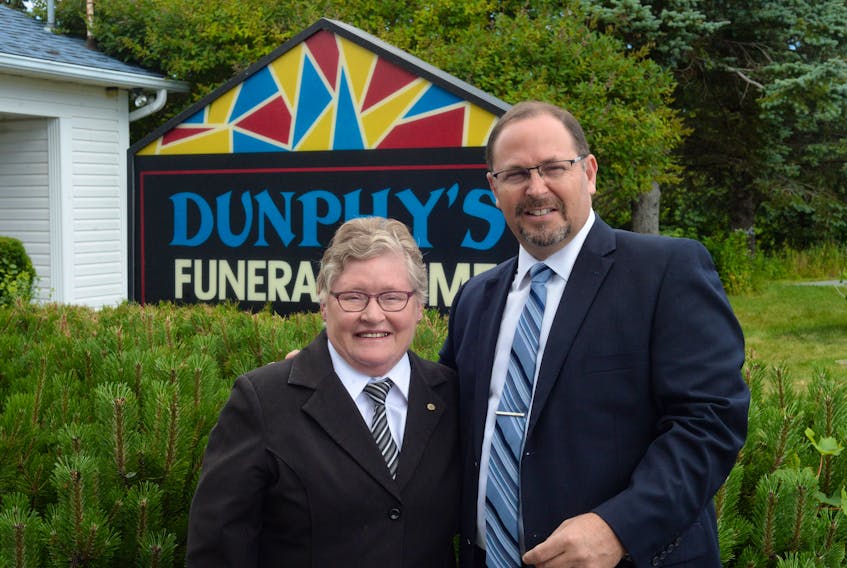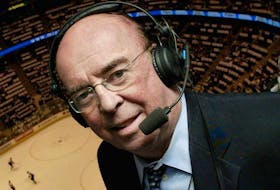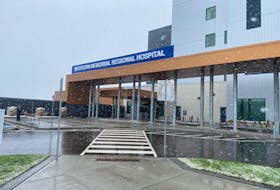HOLYROOD, N.L. — At her last official funeral, Barbara Dunphy donned her father’s top hat and white gloves along with her usual dark suit.
“Some people said, ‘It’s so nice to see the top hat and gloves,” Dunphy said, her voice breaking as she recalled the occasion.
“I was keeping the Dunphy tradition. I was thinking of Dad and grandfather and Kenneth and Mom. A lifetime of Dunphy.”
Dunphy’s Funeral Home has buried generations of countless families in Holyrood and surrounding area since 1892.
But Barbara Dunphy is the last of the Dunphys. And it was time to move on.
Well, sort of — she’s semi-retiring and is training Dunphy’s Funeral Home’s new owner Ron Fitzpatrick in the traditions of the community. She’ll also fill in for Fitzpatrick from time to time.

But there won’t be a Fitzpatrick sign on the funeral home on the town’s main road — across from the former property where the Dunphys got their start in the funeral business.
Fitzpatrick won’t get to wear the Dunphy top hat, but he’ll be keeping the name and the tradition.
“It’s staying in the Dunphy name. (But) there’s a lot of emotions, a lot of history, the whole family considering I am the last of the Dunphys,” Dunphy said.
No descendants
Neither she, nor her two brothers, now deceased, had children.
She lost both siblings in the span of two years — Kenneth, a former elementary school teacher, had run the funeral home, taking over after his father, William, had a heart attack. William Jr. helped out behind the scenes — he was not licensed so was not involved in certain duties.
Kenneth was planning to sell the business and retire at 65, but cancer took him a year after being diagnosed with non-Hodgkin’s lymphoma.
Barb Dunphy had spent a career as an operating room technician with Eastern Health.
Her father died of bowel cancer in 1996 and Dunphy had decided in 1999 to take time off her health care job and do the funeral service course so she could give her brother a break.
“When I retired in 2010, I told (Kenneth) I would give him five years,” she said.
“Of course, he ended up getting sick and … I don’t know what would have happened if I wasn’t here and licensed. I’ve been here ever since. I am almost 46 years working. I just feel it’s time to slow down, semi-retire or something,” Dunphy said.
Since Kenneth’s death, she’s spent three years running Dunphy’s solo, except for some casual, call-in help.
It all started with Michael C. Dunphy, a blacksmith, who was approached by families at first to build caskets, and eventually to transport deceased loved ones to the church and cemetery — the clop-clop of his horses hooves on the way to the church or cemetery soon becoming a telling sound.
He and his wife Annie ran the business out of their home — but not a funeral home as is known today — wakes typically took place in the deceased’s own homes.
His son, William, was the only one of his siblings who went into the business — after working as a mechanic in Greenland, Baffin Island and the former Fort Pepperrell military base in Pleasantville. Michael C. died on Christmas day of 1957. His top hat was sent to the town museum.
William and his wife Marjorie continued the business, and William built the funeral home on its current site in the 1970s — they lived in the house attached, starting off with one visitation room. Over the years it’s been expanded to a large, multi-room facility.

A family affair
Until the mid-1970s, the business’s hearse and ambulance was also the Dunphy’s family car until Barb’s parents finally bought a used vehicle.
She and her brothers started helping as kids.
“I can remember going with my dad as a little girl getting people ready in houses and to the cemetery, carrying the lowering devices and all the equipment,” Dunphy said, noting many times they had to cut out windows and doors to get the casket inside the houses.
Sometimes, people had no space of their own.
“Actually, we had five people waked in our own living room of our own house. I guess people came to us and said they had nowhere to wake them, so we had no choice. Mom said ‘Enough is enough, Dad get going, get moving — open the funeral home.’“
The family would also go out on ambulance calls — the Dunphys got out of that business in the ’70s.
Barb Dunphy said she was never squeamish about the family business and was never teased.
The one unsettling experience was the first time as a child she saw a person with am amputation, and she preferred not to work on those cases in the operating room either.
The funeral business requires families to be on call, 24-7, a practice that continues to this day.
“Dad went on a holiday once with his brother to Nova Scotia to bring back tuna boats,” Dunphy said.
“The furthest my mother ever went was Corner Brook in the second-hand car.”
“Funeral service is not just a job — more a way of life,” said Fitzpatrick, who apprenticed at Caul’s Funeral Home and worked at Carnell’s before going to Alberta where he owned two funeral homes, as well as one in B.C. They were all sold to move home and buy Dunphy’s.
“Especially with technology today — emails get forwarded to your phone. Your phone goes to the shower, the phone is on your nightstand, everywhere you go. Your phone is on the table as you are eating,” he said.
“Mine has been with me for the past three years 24-7,” agreed Dunphy.
People most usually die at night, she noted and if it’s at home, people want the funeral director to come within the hour. Dunphy always insisted on wearing proper attire, whatever the time.
They also have to gather up equipment.
The RCMP could call at any time when tragedy strikes.
“They won’t tell us the name and I don’t know who I am going to. It could be my best friend.
It could be family,” Dunphy said.
The day-to-day running of the business, meeting with families, preparing the deceased and arranging their funerals, taking care of obituaries, co-ordinating bringing a deceased person back from out of province, as well keeping the building spotless and filling out paperwork are among the requirements of the job.
Industry has changed
On average, Dunphy’s handles about 60 funerals a year — from Holyrood and its surrounding communities, including Harbour Main, Avondale, Collier’s, St. Mary’s, Admiral’s Beach, O’Donnells and Colinet.
“Funeral service is not just a job — more a way of life." — Barb Dunphy
Family functions and social plans go by the wayside for a small-town funeral director constantly on call.
“And rightly so. The families … their world just fell apart, so they are relying on you to help them. So, you got to be there,” said Fitzpatrick.
Nowadays, more and more people don’t want long or multi-day wakes, unlike years ago.
“I can remember this was one little wake room — 10 in the morning until 10 at night
When it was in the houses, of course, the men were up all night because it was a party.
"That’s the way it was,” Dunphy said.
“When my dad was here and years ago the men were always tipping, tipping. One fellow was here — he fell asleep and (his friends) laid him down on the couch with rosary beads for a laugh.”
Her grandfather and father were referred to as undertaker — complete with their pals’ jokes about them carrying around a measuring tape — but funeral director has since replaced that moniker.
Dunphy learned over the years from her parents how to deal with families in different situations.
On one occasion, a daughter begged to see her father, but because of the nature of the death, they suggested it wasn’t a good idea.
“We said ‘OK we’ll tell you what we’ll do, we’ll put his hand out and you can touch his hand.’
"He had lost part of his finger though a lawnmower accident and she knew it was him because of that,” she said.
Another time, a mother asked for a lock of her son’s hair.
“I said ‘Yes, my darling.’ He had beautiful, beautiful hair, curls galore. I went and I got the scissors and said ‘Why don’t you cut off the hair?’…. She was happy she took the scissors and cut it herself,” Dunphy recalled.

Recently, she overheard a little girl asking, “Did that lady cut off Nan’s legs?’ "referring to the tradition of the casket being open from the waist up.
Dunphy showed the girl her grandmother’s legs in order to reassure her and explained the closed half of the casket allows for nice flowers to be displayed.
Dunphy sees her job not as living constantly with death, but helping the families left behind.
She has been hit just as hard by her own grief.
“I remember when my dad died, he waked here for a day and a half and I just couldn’t come out because we were really close,” she said. “I remember coming out myself in the middle of the night and I saw him and I could talk to him and I cried … and I felt better then… He was gone five years before I would actually say he was dead.”
Though Dunphy had advertised the funeral home for sale in the Canadian Funeral News magazine, Fitzpatrick heard about it from a friend at a continuing education seminar.
They talked back and forth for about a year.
“I was thinking about it and thinking about it and I finally admitted it to myself about three months ago. I said ‘I am done.’ You got to know when you are ready. Now, I still love it,” she said.
In 2015, she joined a volunteer crew building classrooms in Guatemala and hopes to go back and volunteer in her semi-retirement.
“Nine women pouring cement you name it – just the same as you were building a house here,” she said.
“The happiest part was seeing those little children, how happy to see the smiles on their faces.”
The personal touch
Fitzpatrick was an elementary school music student of Kenneth Dunphy and had known him while working in the funeral business in St. John’s, so knew the history of the Dunphys.
“Barb’s grandfather was a pioneer in funeral service,” he said.
“Ken lived here in the house. There would be a visitation coming on and he would have a pot of soup on the stove or ham in the oven or a turkey. The family (of the deceased) would be out in (his) kitchen eating and visiting. It was a unique service here.”
That tradition waned as families chose fewer visitation hours and Kenneth Dunphy found himself throwing out a lot of food.
But it’s often happened that the Dunphys invited exhausted family members of a deceased to take a nap in their residence.
“You wanted the family to be treated the way we wanted to be treated,” Dunphy said.
“Even after my brother died, I was really busy. I had 65 funerals the years he was sick and 72 the year after he died and it was just bang, bang, bang one after the other. Anyway, one lady pulled in said ‘Barb I am just praying that the next person dies, goes to (nearest competitor) Hickey’s to give you a break. Not that I want them to go to Hickey’s but to give you a break.’”
“You wanted the family to be treated the way we wanted to be treated." — Barb Dunphy
Dunphy said her brother was well suited to the job.
“Ken was one of a kind. … It was unbelievable — the faith and the dedication. … He’d move Earth and home to do anything for a family.”
She recalled a woman killed downtown in a horrific accident involving a crane.
“He worked hours and hours and hours so he could have her open (casket). He got her open and that meant more to her husband and family,’ Dunphy said, tearing up again.
“Families come in here and I cry with them the same because they are family.”
As for Fitzpatrick, his parents, Ron and Mary, are glad to have him in a close-by community they love.
“We were thrilled. He was away for 19 years,” said Mary.
Twitter: @BarbSweetTweets
RELATED









